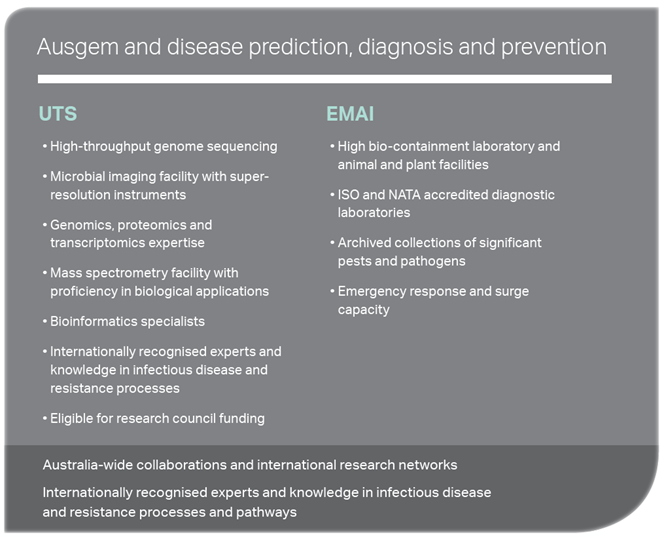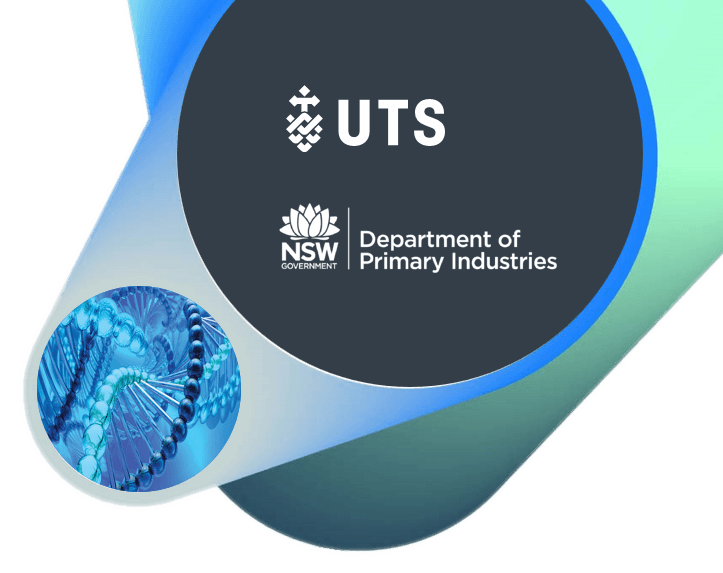The story so far
UTS and EMAI: A unique blend of capability and knowledge
AusGEM is able to predict, diagnose and prevent disease by combining the genome-based technology skills at UTS with the disease control and outreach expertise at EMAI.
The Australian Institute for Microbiology & Infection (AIMI), formerly the ithree institute
Based at the University of Technology Sydney (UTS), AIMI brings together a team of scientists who use and apply cutting-edge research methods and tools to understand how microbes grow, live, adapt, and survive, with a focus on antibiotic resistance, infectious diseases, vaccine development, and biosecurity.
The Elizabeth Macarthur Agricultural Institute (EMAI)
EMAI is the NSW Department of Primary Industries (DPI) Centre of Excellence for Animal and Plant Health. Established in 1990, it plays a vital role in protecting Australia’s economy, community and environment from animal and plant pests and diseases. EMAI laboratories monitor the disease status of the state’s primary industries and provide certification for freedom from specific diseases.

AusGEM 1 (2013-2016)
During this initial three-year program, AusGEM’s DNA-based approach led to a better understanding of a tick-borne parasite that causes anaemia in cattle and bacteria that have a devastating effect on a range of plants.
The research also provided a baseline measurement for understanding what genetic elements containing antibiotic resistance genes are circulating in the environment and between humans, horses, pigs and poultry.
These results provided clues as to where the next outbreaks of disease may surface and can inform treatment decisions. AusGEM has also supported the training and career development of numerous students and researchers.
AusGEM 2 (2017-2019)
AusGEM 2 further advanced the achievements of AusGEM 1 through the development and use of new technologies to fight pests and infectious diseases. This phase included additional studies to determine the effectiveness of interventions such as prebiotics, probiotics and vaccines in disease management and as alternatives to antibiotics.
AusGEM’s research has advanced the understanding of Mycoplasma hyopneumoniae, a pneumonia-causing bacteria in pigs, and has enabled researchers to continue to work towards a vaccine. Research undertaken during this phase has also led to a better understanding of the role of the microbiome in oyster disease, with research suggesting there is a link.
This phase supported several PhD students through their studies and enabled AusGEM researchers to progress their careers.


AusGEM 3 (2020-2023)
The success of AusGEM 1 and 2, coupled with the strength of the NSW DPI and UTS relationship, has enabled the AusGEM collaboration to enter its third phase, which commenced in mid-2020. Investment by NSW DPI and UTS and the significant achievements of the AusGEM programs have provided AusGEM 3 the opportunity to expand its presence and evolve its focus, while still aligning to a One Health framework. AusGEM 3 will also enable new partnerships and collaborations.
AusGEM 3 will see research undertaken in new areas such as virome sequencing, which will develop methods that underpin opportunities for future studies in the field of viral diseases of livestock. The inclusion of viral studies in the AusGEM framework aligns with AusGEM’s goal of improving understanding of infectious diseases in the Australian agriculture sector.
The first plant-based project in the AusGEM partnership will be included in AusGEM 3, and its outputs will benefit growers and horticultural industries through future application in surveillance and disease forecasting. Additionally, AusGEM 3 projects will strengthen the capacity to identify and respond to biosecurity threats through the combination of diagnostics for endemic diseases and exotic diseases of biosecurity concern. Expansion of AusGEM’s research program to investigate the molecular epidemiology of non-microbial pests has the potential to more broadly promote the impact that AusGEM is having on biosecurity threats.
AusGEM 3 will ensure its science base continues to grow through ongoing engagement with both internal, and external partners, including government, Australian and international universities, agricultural industries and government organisations.
